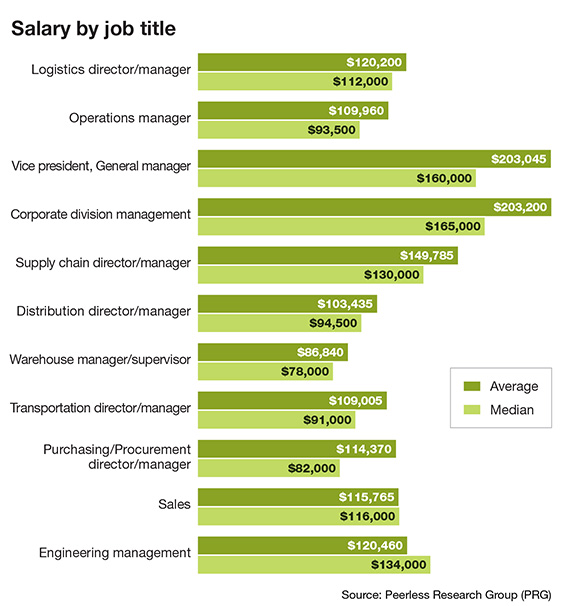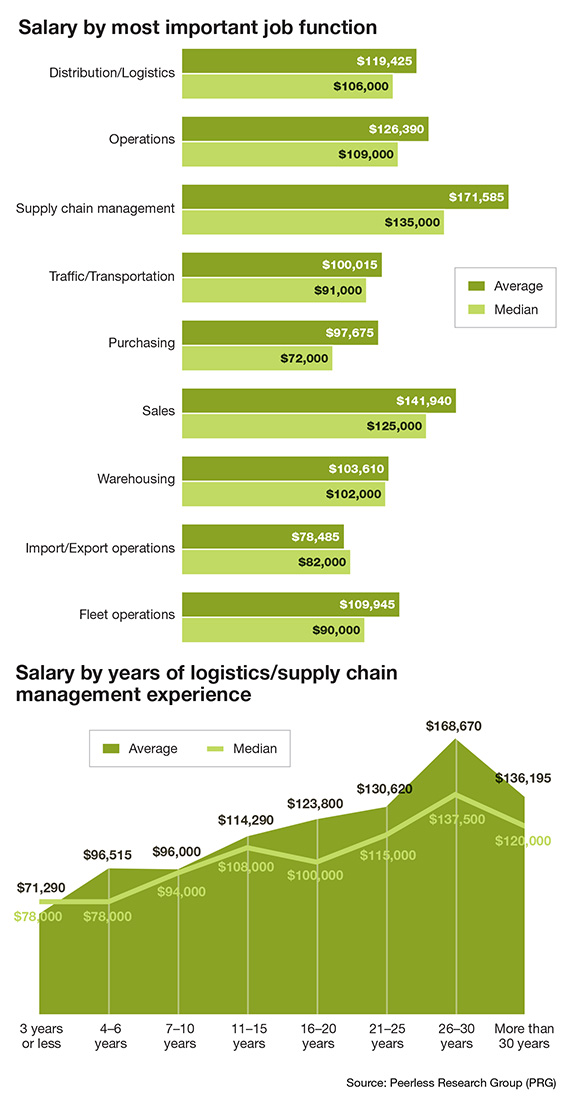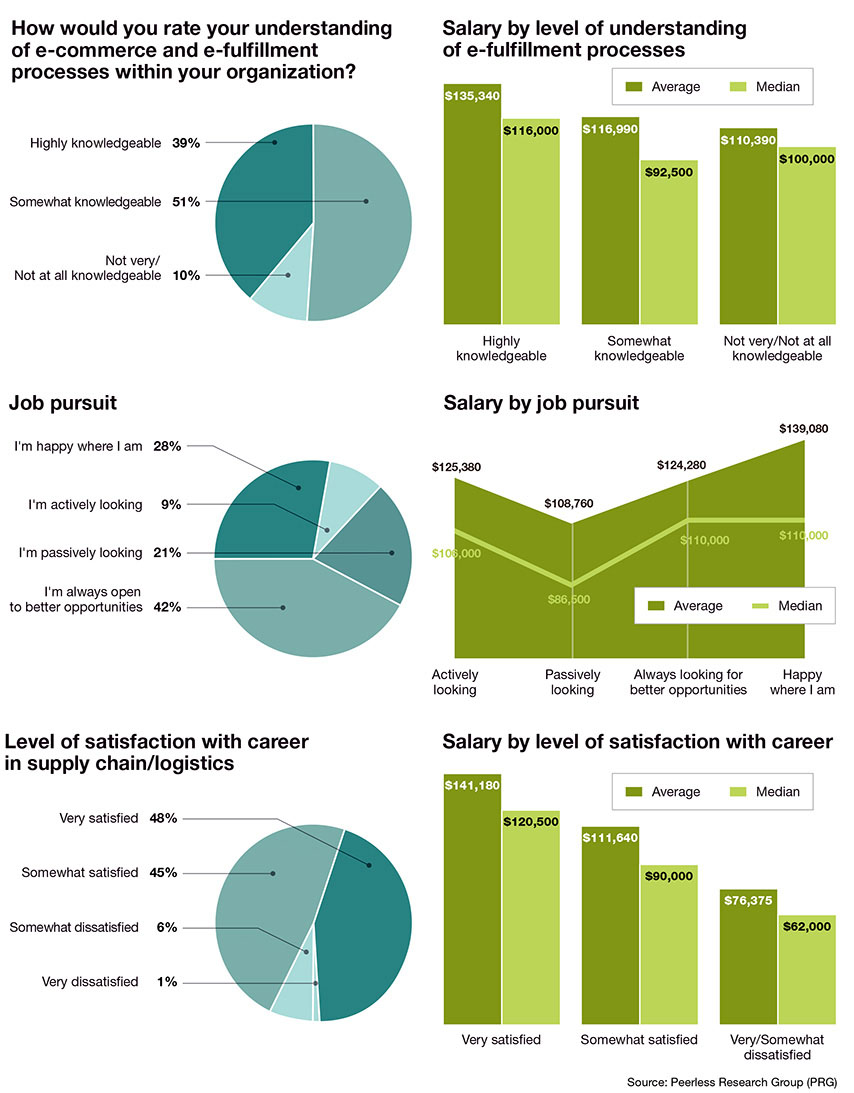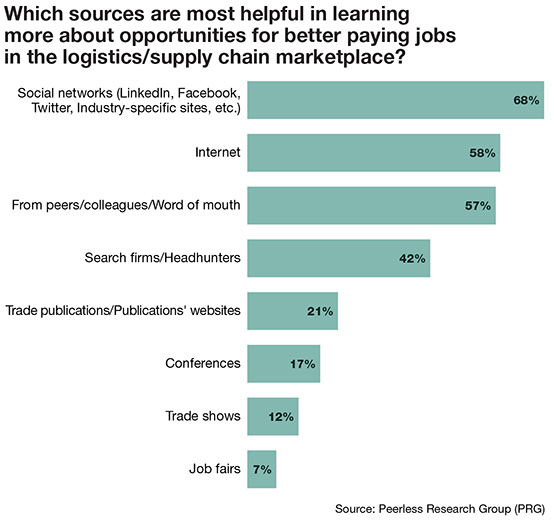36th Annual Salary Survey: Earning more, but enjoying less?
Job satisfaction took a hit this past year, as more logistics managers were loaded with additional tasks and business objectives. Salaries continued to climb, however, suggesting that demand for these skill sets has never been higher.
More than 400 logistics professionals participated in our annual salary survey this year just before the full impact of the COVID-19 pandemic was felt across the nation. That said, researchers were heartened to see that logistics salaries for early 2020 increased precipitously over 2019 figures.
Our analysts at Peerless Research Group (PRG) further note that the demand for skilled labor remains higher than supply, while the competitive value of newly minted logisticians appears to have outpaced increases in other supply chain costs such as transportation.
“And what’s really key about this,” says PRG research director Judd Aschenbrand, “is that employers appear to be willing to pay.”

As in past years, experience counts, with those with 15 years or more seeing a substantial bump in compensation this year. The data also supports the view that logistics managers are taking on broader responsibilities—a fact that may be hurting morale.
“It’s interesting to note that the level of satisfaction with career declined, with this year’s data pointing to a substantial reduction from 2019’s 56% of respondents saying they’re ‘very satisfied’ to 48% in 2020,” says Aschenbrand. “Most of the ‘very satisfied’ people seem to have shifted into ‘somewhat satisfied,’ a category that increased from 38% in 2019 to 45% of respondents in 2020.”
According to Michael Gravier, an associate professor of marketing and supply chain management at Bryant University, the explanation of this trend could be found when researchers asked: “What factors mostly contribute to any dissatisfaction you may have with your current job?” The percentage of respondents who implicated “company politics” jumped from 42% in 2019 to 49% in 2020.

“It also seems that workload has become an increasingly cited source of dissatisfaction,” says Gravier. “Perhaps most telling is that ‘no room for advancement’ went from 26% of respondents in 2019 to 33% in 2020.”
Furthermore, our results reveal that the stresses of tariff wars, supply chain redesigns, unraveling globalization and technological advances are taking their toll on job satisfaction. “The one factor companies control is internal politics—although as logistics managers become more important to a company’s success, they may seize more of their own leverage,” adds Gravier. (See sidebar.)

Talent crunch
Meanwhile, logisticians should continuously seek to “posture” for the next growth opportunity, says Timothy Hawkins, Ph.D., an associate professor of logistics management at G. Brint Ryan College of Business at the University of North Texas.
“But this is only true if limited to no more than four employer changes over a career,” cautions Hawkins. “More than that and salary starts to decrease.”
According to Hawkins, this posturing could entail advanced education, training, expanded breadth of experience, challenging assignments (e.g., P&L responsibility, agility to new tariffs, and managing through the COVID-19 pandemic), experiencing new regions of the world, and taking on leadership positions.

“From the respondents’ comments on skills and expertise needed to improve pay or position, it appears that analytical skills are in demand regardless of salary,” says Hawkins. “Further, the higher-echelon positions seem to acutely need skills and experience in technology, artificial intelligence, machine learning, automation, and robotics.”
For Hawkins, it also appears that for the highest-echelon positions, strategic sourcing (i.e., supply management) appears to be an essential capability. This makes perfect sense given that supply management optimizes 30% to 70% of revenues by building supply coalitions of hundreds to tens of thousands of suppliers—given the current environment of global disruptions.
“Coordinating all of the necessary logistics activities among so many entities is a chief source of complexity,” Hawkins concludes. “Those who do it better are rewarded, and those who don’t, well, best wishes.”
Social networking
What would you say have been the most important steps in advancing your career?
Personal or social networking remains the most important way to advance a logistics and supply chain career, followed by education and certification. At the same time, industry and professional associations appear to be losing their importance.

PRG research indicates that social networks (LinkedIn, Facebook, etc.) have substantially increased their importance for learning about job opportunities—from 59% of respondents in 2019 to 68% in 2020.
Gartner speculates on a post-COVID-19 hiring scenario
In order to limit the impact of COVID-19, many logistics managers had been instructed by local governments or advised by their employers to stay at home.
Employers had put in place controls around travel and site visitors. For factories, this resulted in goods not being produced and exported to dependent markets or other factories. As long as this situation continues, supply chains won’t work as intended.
“As the virus extends globally, supply chain leaders need to think about how to protect the health of workers, and support individuals who are ill,” says Sarah Watt, senior director and analyst with the Gartner supply chain practice. “Providing clear and consistent communication through human resources and travel security is essential. As this crisis is ongoing, the risk is that crisis management teams become fatigued and make poor decisions.”
But once this is all over, might there be a silver lining for logistics managers? Courtney Rogerson, senior principal analyst at Gartner, believes so.
“With the rise of Amazon and e-commerce, logistics has become a strategic differentiator,” says Rogerson. “What the pandemic has reminded us is how critical supply chain and logistics are at the foundational level. While the growth of digital business holds the promise of innovation, optimization, and new products and services, physical goods can’t reach their destination without physical assets to get them there.”
According to Rogerson, logistics thought leadership and management is coveted in the industry today. And, as the importance and demand for leading logistics talent increases, naturally so must compensation.
“The responsibilities of logistics management now and in the future must go beyond simply executing traditional, operational tasks,” Rogerson adds. “Logistics leaders must be able to be design new and differentiated solutions, engage and optimize across an increasingly complex network of extended partner ecosystems.”
Finally, managers who have already been burdened with more things to track must now assess risk and prepare for continuity in the face of uncertainty. For those who now possess digital dexterity and can execute seamlessly to deliver the perfect order, the compensation will only get better.”
Time will tell if this is a long-term trend, but professional and industry associations have been hemorrhaging members, and a frequently cited factor is their outdated social networking model. They’ve gone through waves of consolidations and mergers, and they’ve invested in more tangible—and lucrative—benefits such as certifications.
Yet it appears that the certifications are the limit of the benefit for most professionals. This suggests an important question: If networking is the most important way to advance a career, how are professionals engaging in networking?
“Is modern social media entirely replacing the professional associations’ traditional social networking roles, or is there something else happening?” asks Aschenbrand. One possibility is that as logistics management-related leaders have become more strategically important to companies, professional associations that focus too narrowly may fail to provide adequate networking possibilities.
“Logistics leaders need to influence leaders from other parts of the business, and are unlikely to get promoted if they focus on influencing only other logisticians,” concludes Aschenbrand.
Insight
Labor in the logistics “nervous system”
If inventory is the lifeblood of supply chains, labor is the nervous system. Soon, a lot more is going to be written on the lack of a workforce skilled enough to use the current technology.
Heading into 2020, the overall labor market was positive, with low unemployment and an increase in median wage. The bad news: job creation has been concentrated in low- to mid-paying jobs and labor force participation is relatively low. Most relevant to logistics managers: government statistics indicate that there’s a rising skills mismatch in the labor market.
The pace of technology has outpaced the labor market’s ability to train, re-train and re-educate workers. Traditional educational paths are slow to educate, unresponsive to society’s needs, and leave too many students with intimidating amounts of debt. By some counts, colleges have failed to build supply chain programs at a pace that will fill even a quarter of the degree-requiring jobs of the future, prompting some companies to build in-house “universities.”
The most acute pain resides at the level of entry-level technical jobs. These are the frontlines of supply chain labor, where workers make and assemble products and services—and directly at the interface of company customer service and order fulfillment. Several leading supply chain companies such as IBM, Bosch, Ford, Barclays, Toyota and Walmart are among the organizations studying and implementing apprenticeship programs.
Logistics management has a strong tradition of industry working with academia, including colleges and vocational and technical schools. We are entering an era where the most successful companies will be the ones that take leadership in developing proficient and adaptable labor markets.
Companies that find relationships with schools will provide the schools and students with valuable insights into needs. In return companies gain the insights of research and institutions with a longer vision so that they aren’t unduly swayed by fads over genuine trends. And both companies and schools gain access to workers who want and need work useful to society.
Everyone is better off when surrounded by a healthy ecosystem populated by able and productive workers; furthermore, maximizing the value of those workers creates a healthier consumer market that forms the foundation of our economy. It does no good to implement advanced—and expensive—technology that workers can’t use properly.
Logistics managers will enjoy profitable and efficient supply chains in proportion with their labor’s ability to leverage technology. Are you getting ready for the future?













